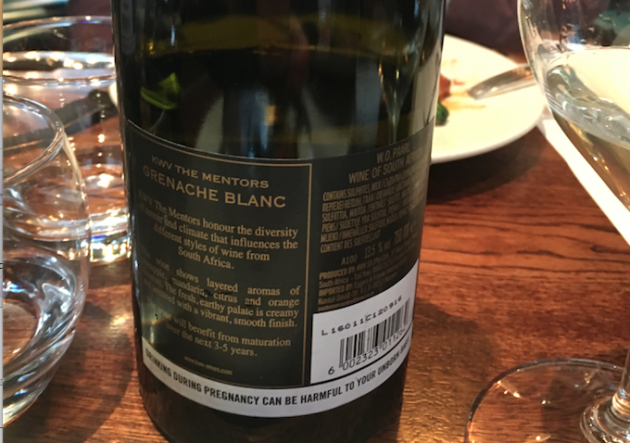
KWV repositions itself towards independents and the on-trade
South African wine and spirits giant, KWV, has embarked on a new transition towards selling premium wines in Britain.
KWV, which has been revamped by its new owners – UK investment group Vasari, still predominantly makes big volume wines for supermarkets - this year it has secured new UK listings at The Co-op and Morrisons for instance, but over the past year it has been re-positioning itself in the UK towards the independent retailers and in the on-trade with wines priced between £7 and £15.
“There is a new focus; a repositioning in the UK market. In the past the focus was on volumes, but not at sustainable prices,” said Wim Truter, who was appointed as head winemaker at KWV in September, 2016.
“We are adding more identity and personality to each wine: we’re picking earlier and looking for purity of expression,” Truter said, adding KWV was not just making cheap wines and sticking a label on it.
Truter, who was a on a visit to Britain this week, said KWV’s owner Vivian Imerman, who concluded the acquisition of KWV from the HIC-controlled Niveus Holdings in October 2016, had given him freedom to develop KWV’s wines.
Imerman - known as the ‘Man from Del Monte’, who made millions from the sale of Scotch whisky company Whyte & Mackay in 2014, has worked with KWV’s new chairman Pedro Lotra to ramp up KWV’s sales team.
In addition, KWV strengthened its positioning towards the premium end of the UK market with the appointment of North South Wines as its UK distributor in February 2016.
KWV’s repositioning in the UK follows the overall fall in the Rand currency and general increase in quality of wines which have helped lift South African wine exports to the UK.
Co-op now stocks its Walker Bay Grenache Blanc at £9, and new to the UK is KWV’s premium £14.95 Mentors Grenache Blanc 2015, a wine which is part of the revamped Mentors range aimed at the on-trade and independent retailers.
South Africa has been best known for its production of Chenin Blanc and Pinotage, but KWV is now increasingly focusing on single varietal wines, notably Grenache Blanc and Petit Verdot, giving itself room to distinguish itself from its own large-volume production of Sauvignon Blanc.
KWV controls two-thirds of Grenache Blanc production in South Africa and next year it’s increasing plantings of the Spanish grape variety with five new hectares in Swartland.
With its refreshing notes of apple, blossom and toasted almonds, the Mentors Grenache Blanc 2015 wine could easily be confused with a Riesling; it has been acidified, Truter admitted, but to a far less extent than KWV’s Sauvignon Blanc wines.
Grenache Blanc, Petit Verdot and Shiraz are varieties known for coping well in hot climates. “We are focused on freshness, longevity and acidity,” he said.
A strengthened focus on these single varieties comes amidst two consecutive dry years in the Cape, with South African producers now grappling with drought.
“When people are faced with having no drinking water, wine becomes a secondary matter; we have reduced irrigation to 40% of vines,” he said.
Once a co-operative, which held a monopoly of production under the apartheid regime, KWV retains long-term agreements with 54 growers in South Africa.
It said its decision not to produce any white wines in 2016 highlighted its focus on quality production.
With the use of micro-vinification, micro-cellars and fine-tuning of integrated oak selection and the experimentation on small parcels, including the production of sulphur-free wines in smaller batches, Truter said he hoped the results of his endeavours will be applied to the production of bigger volume wines.
The round, supple and soft tannins of KWV’s reds from the Mentors range, its Classic collection range and its Walker Bay Shiraz, which will be stocked this year in Morrison’s at £8.50, show a drinkability achieved through “the management of extraction and fermentations” said Truter.
Meanwhile, regarding KWV's zero -sulphur Earth’s Essence wines, which are fermented and matured using indigenous wood and honey bush plants, Truter said, he is now turning around tannins extract from the wood to ensure the stronger anti-oxidant has less of an impact on the aromatic profile of wines.
He was also looking to make wine in amphoras acquired from Italy, he said.




